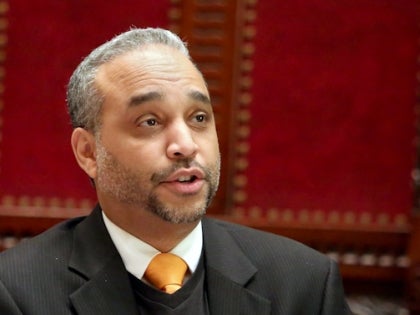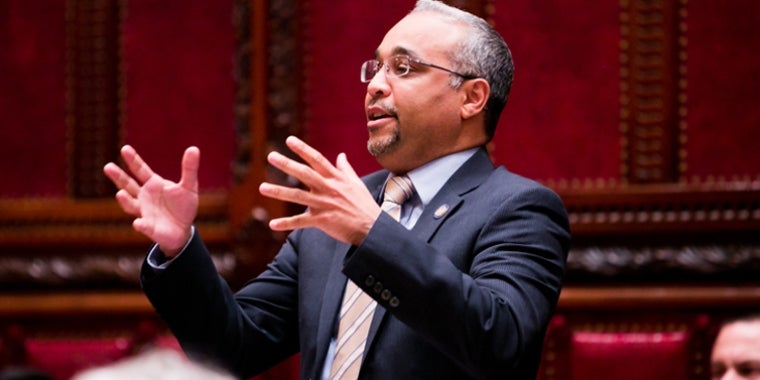
Fox-Cablevision Blackout Reaches a 2nd Day
New York Times
by Brian Stelter and Bill Carter
October 17, 2010
What started as a routine contract dispute between Cablevision Systems and the News Corporation has become one of the longest and most talked about blackouts of television programming in years.
About three million households in the New York metropolitan area were left without Fox programming on Saturday and Sunday, preventing sports fans from watching a Phillies game on Saturday night and a Giants game on Sunday afternoon. After months of negotiations, the two companies cannot agree on a price for retransmission of the Fox network.
Cablevision and the News Corporation talked for only a few hours on Sunday, and Fox said they were still far apart. By Sunday evening, television analysts who had predicted a resolution by the kick-off of the Giants game wondered aloud whether the two media giants could drag out the fight until the start of the World Series, which Fox is to start broadcasting on Oct. 27.
Broadcasters view retransmission as an important new source of revenue and that is one reason the dispute is being closely watched by lawmakers; some have already proposed reforms to the station retransmission process.
The stakes are especially high for Fox because another potential blackout is looming. Some of Fox’s local station contracts with a bigger distributor — Dish Network — expire at the end of the month. The network is already running advertisements warning customers that the World Series could be interrupted.
More than three million of Dish’s 14 million subscribers could be affected, depending on where they live.
Blackouts of local stations rarely last longer than a day, as stations risk losing ratings and advertisers and distributors risk losing customers altogether. But for the News Corporation, at least, the long-term health of the broadcasting business is on the line.
In recent years it, like the owners of other local stations, has ratcheted up its demands for retransmission fees to try to create a second source of revenue to reduce reliance on advertising.
Envious of the fees that cable channels receive from distributors, stations want to be compensated for providing the most popular programming on television: hit prime-time shows and big sports events. Of course, the stations are still available free over the public airwaves.
Distributors say they want to hold the line on further price increases, which are added to the monthly bills of customers.
“These disputes are happening more often and they’re lasting for longer periods of time,” said Derek Baine, an analyst at SNL Kagan.
Cablevision’s last fight over fees happened in March. That time it was with the Walt Disney Company over fees for the ABC network, and it culminated in a 20-hour cutoff that briefly interrupted the Academy Awards.
During that standoff, analysts said it was only an early skirmish in what was likely to be a long and bitter war over retransmission fees. Future battles, they predicted, were likely to involve the most popular programming the networks had to offer, specifically big sporting events.
In this case, Cablevision says it is pushing back against the News Corporation’s demand for an increase in fees to $150 million a year from $70 million.
Cablevision claims that it already pays for rights to retransmit programming from its Fox network by paying fees for the cable channels that the News Corporation owns. But News Corporation executives cite the value of their programming and point to how much Cablevision pays itself for small cable channels like MSG, which Cablevision owns.
For weeks, both companies have been working publicly to make the other seem like the holdout.
After about three hours of talks on Sunday, Fox said, “No material progress was made and we continue to remain far apart,” the same language it used after negotiations a day earlier.
In a separate statement on Sunday afternoon, Cablevision said: “The longer this shameful News Corp. blackout of the N.F.L. and Major League Baseball continues, the more obvious it becomes to everyone, including political leaders of both parties, that binding arbitration is the fastest and fairest way to return Fox programming to Cablevision customers.”
Cablevision has been pushing for days for arbitration, an idea that Fox has rejected.
Customers and politicians spared no scorn for both Cablevision, which is controlled by the Dolan family, and the News Corporation, which is led by Rupert Murdoch.
José R. Peralta, a Democratic state senator from New York, said on Sunday in a statement: “On behalf of the millions of hard-working men and women and their families who simply want to relax and enjoy a ballgame, or have a few laughs watching television during their free time — a luxury they’ve paid for — I urge that programming be restored immediately while negotiations continue.”
Fox has refused to do so. The network says payments for providing local stations are a matter of fairness. “We need that dual revenue stream,” said Chase Carey, the chief operating officer of the News Corporation, in an on-stage interview at a Hollywood event last month. “The broadcast networks for too long have accepted being second-class citizens.”



